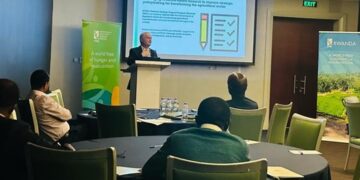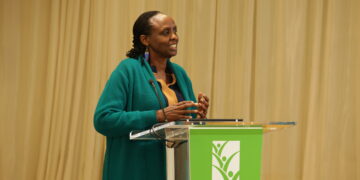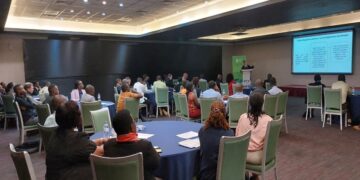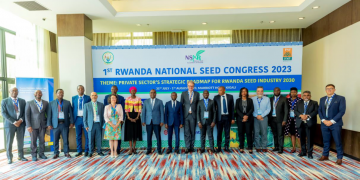This blog post is part of a special monthly series entitled “Making a Difference,” documenting the impact of IFPRI's projects and initiatives. These stories reflect the wide breadth of the Institute's research, communications, and capacity-strengthening activities around the world, in fulfillment of its mission. The blog series has been peer-reviewed by IFPRI's Impact Committee members.
IFPRI WORKSHOP: TRANSFORMING RWANDA’S AGRICULTURE: EVIDENCE-BASED RESEARCH DRIVING POLICY AND RESILIENCE
On December 2, 2024, the International Food Policy Research Institute (IFPRI) - Rwanda Strategy Support Program in collaboration with the Ministry of Agriculture and Animal Resources (MINAGRI), hosted a high-level event at the Park-Inn Hotel in Kigali under the theme STRENGTHENING RWANDA’S FOOD SYSTEMS: RESEARCH-DRIVEN INSIGHTS FOR ENHANCED POLICY MAKING. This gathering of policymakers, researchers, […]
Agnes Kalibata explains that Rwanda managed to dramatically reduce poverty in Rwanda by focusing on the livelihoods of the poor, and points to the helpful evidence provided by IFPRI to support this effort.”
“Success has many parents:” Agnes Kalibata explains that Rwanda managed to reduce poverty in Rwanda over five years by focusing on the livelihoods of the poor and points to the helpful evidence provided by IFPRI to support this effort
SEED SECTOR DEVELOPMENT IN RWANDA: A VALIDATION WORKSHOP ON POLICY, REGULATION, AND PRACTICE.
The focus on growth in Rwanda’s seed sector reflects Rwanda’s commitment to transforming agricultural production as outlined in the nation’s fourth Strategic Plan for Agriculture Transformation (PSTA 4). Since 2019, efforts to rapidly privatize seed production and distribution have brought many different perspectives to the table, with a range of views emanating commercial seed companies, […]
Inaugural Rwanda National Seed Congress paves the way for sustainable seed industry growth.
The inaugural Rwanda National Seed Congress, which took place in Kigali from 31 July to 1 August 2023, marked a significant milestone for the country’s seed industry. Themed “Private Sector Strategic Roadmap for the Seed Industry 2030”, the event brought together key stakeholders from the government, public, and private sectors to address challenges and opportunities in the national seed value chain. During the Congress, several key recommendations were proposed to increase the potential of the seed industry. By Marion Aluoch
- 1
- 2
- 3
- …
- 5
- Next Page »



